An RV water pump is a small but mighty device that is responsible for delivering water from your RV’s fresh water tank to your faucets and shower. The pump is typically installed near the freshwater tank and is powered by the RV’s electrical system or by a separate battery. RV water pumps are essential for providing a reliable source of water for drinking, cleaning, and other household activities while on the road.
A good RV water pump is a necessary component of any RV water system. It can help to ensure that you have a reliable source of water, conserve resources, and make your travels more enjoyable and convenient. This article will teach you about the best RV water pumps available in the market, the types of RV water pumps, and answer your general questions about RV water pumps.
What is an RV Water Pump and how does it work?
An RV water pump is a device that is used to pump water from a freshwater tank into the plumbing system of a recreational vehicle (RV). The pump is typically installed near the freshwater tank and is powered by the RV’s electrical system or by a separate battery.
The camper water pump is an essential component of the RV’s water system, providing a reliable source of water for drinking, cleaning, and other household activities while on the road. So, if you’re planning to go camping in your RV, make sure to check your water pump for RV before hitting the road.
1) How does an RV Water Pump Work?
RV water pumps use a motor to create pressure that forces water from the RV’s fresh water tank through the plumbing system. When a faucet is turned on, the water pressure drops, triggering the water pump to kick on and restore the pressure. Most RV water pumps are self-priming, meaning they can draw water up from the tank even if it’s not located directly below the pump.
2) When to use a water pump in RV?
The water pump in an RV should be used whenever you need to access water from the freshwater tank. Also, the RV water pump should only be turned on when you need to use water and turned off when you are finished using it. Leaving the pump on when it’s not needed can cause wear and tear on the pump and drain the RV’s battery or electrical system.
What are the different types of RV water pumps?
There are almost nine types of water pumps, but the two major ones are described here.
1) Diaphragm pump
Diaphragm pumps use a flexible diaphragm to move fluids by creating a vacuum that draws fluid in through the inlet valve and pushes it out through the outlet valve. They’re ideal for applications that require a consistent flow rate and pressure, including water treatment, chemical processing, and oil and gas production. RV owners often prefer diaphragm pump water systems because of their reliability and efficiency.
2) Centrifugal pump
Centrifugal pumps are the dynamic pumps that use a rotating impeller to move fluids. The impeller is typically a rotating disk with curved blades that create a centrifugal force, which moves the fluid outwards towards the edge of the impeller. As the fluid flows outwards, it passes through a volute or diffuser, which converts the kinetic energy of the fluid into pressure energy and directs the fluid towards the discharge outlet.
Centrifugal pumps are frequently used in an extensive range of commercial, industrial, and residential applications, including chemical processing, irrigation, water supply, oil and gas production, and HVAC systems.
3) Comparison between Diaphragm pumps and Centrifugal pump
Diaphragm pumps and centrifugal pumps are two different types of pumps with distinct operating principles and application areas. A comparison of some key features is as follows.
● Operating principle: Electric Diaphragm water pumps use a flexible diaphragm to move fluids, while centrifugal pumps use a rotating rotor to generate a centrifugal force that moves the fluid.
● Flow rate and pressure: Centrifugal pumps are typically better suited for high-flow rate, low to moderate pressure applications, while diaphragm pumps are better suited for low to moderate flow rate, high-pressure applications.
● Power source: Diaphragm pumps can be powered by electricity, air, or hydraulics, while centrifugal pumps are typically powered by electricity or diesel engines.
● Fluid handling: Diaphragm pumps can handle a wider range of fluids, including corrosive and abrasive fluids, while centrifugal pumps are better suited for handling clean liquids with low viscosity.
The 5 best RV pumps in the market
A reliable freshwater pump RV is essential for a comfortable and convenient camping experience. Don’t let an rv water pump not working ruin your camping trip. Buy the best water pump for campers. Following are the best RV pumps for you in 2023 if your RV water pump needs replacement.
1. VEVOR 12V water pressure Diaphragm Pump
The VEVOR 12 volt RV water pump is a type of diaphragm pump designed for pumping water, liquids, and chemicals in various applications.
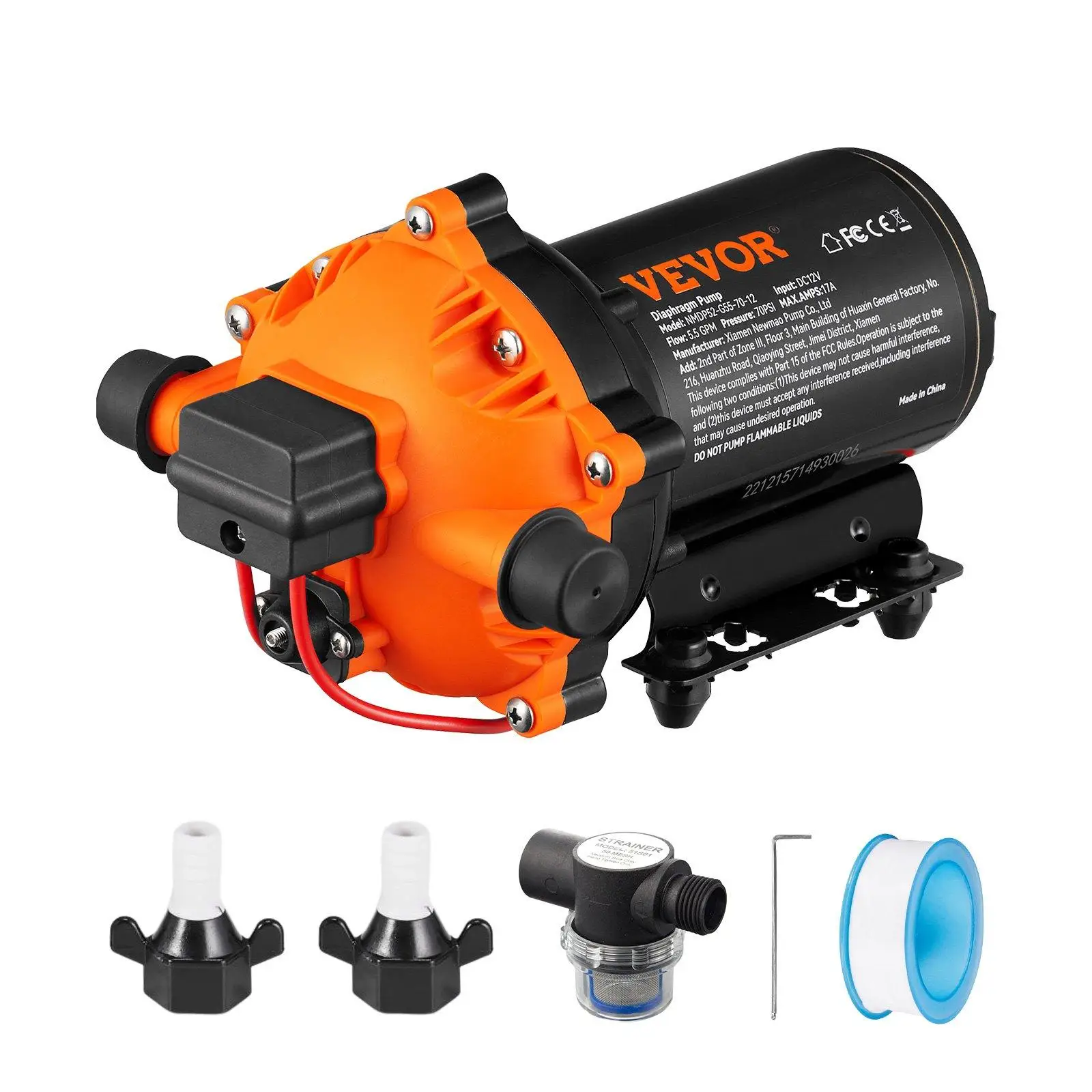
Features:
● Compact and lightweight design for easy installation.
● Self-priming with a pressure switch that mechanically turns the pump off and on.
● Built-in thermal protection to prevent overheating.
● It can run dry without damage, making it suitable for intermittent use.
● Corrosion-resistant construction with high-quality materials.
● Low power use and high performance.
Specifications:
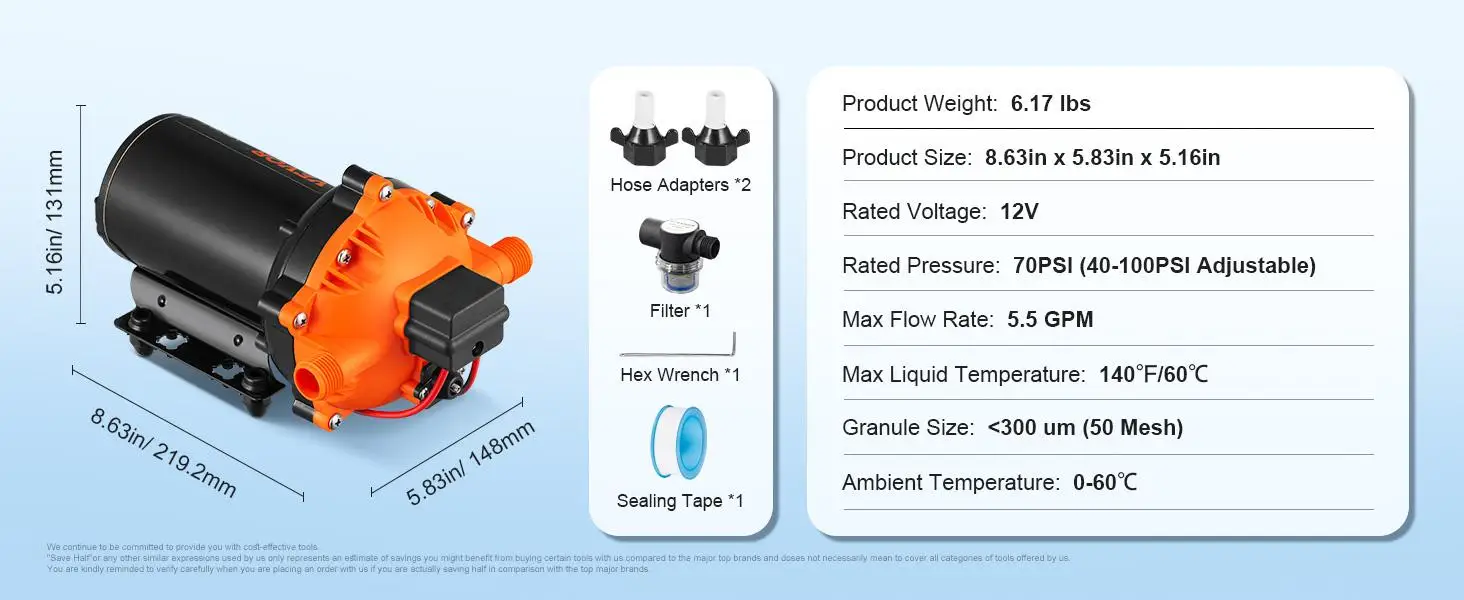
Voltage: 12V DC.
Power: 60W
Inlet/Outlet: 0.5 inch (12.7 mm) barb.
Max. Head: 98ft.
Max. Suction Lift: 6.6ft.
Self-Priming: Yes
Performance:
Vevor 12v water pump rv provides a maximum flow rate of 3.3 to 5.5 GPM and pressure ranging from 40 – 100 PSI. Also, it is suitable for use with water, liquids, and chemicals with low to moderate viscosity. However, it can be used for several applications, including water transfer, spraying, irrigation, and pressure boosting.
Pros:
● Compact and lightweight design for easy installation and transportation.
● It can run dry without damage, making it suitable for intermittent use.
● Corrosion-resistant construction with high-quality materials for durability.
● Low power consumption and high efficiency.
Cons:
● It may not be compatible with some chemicals or liquids with high viscosity.
2. Shurflo fresh water pump
Shurflo is a well-known brand in the water pump industry and is on the 2nd number of our list, and they offer a range of freshwater pumps for various applications.
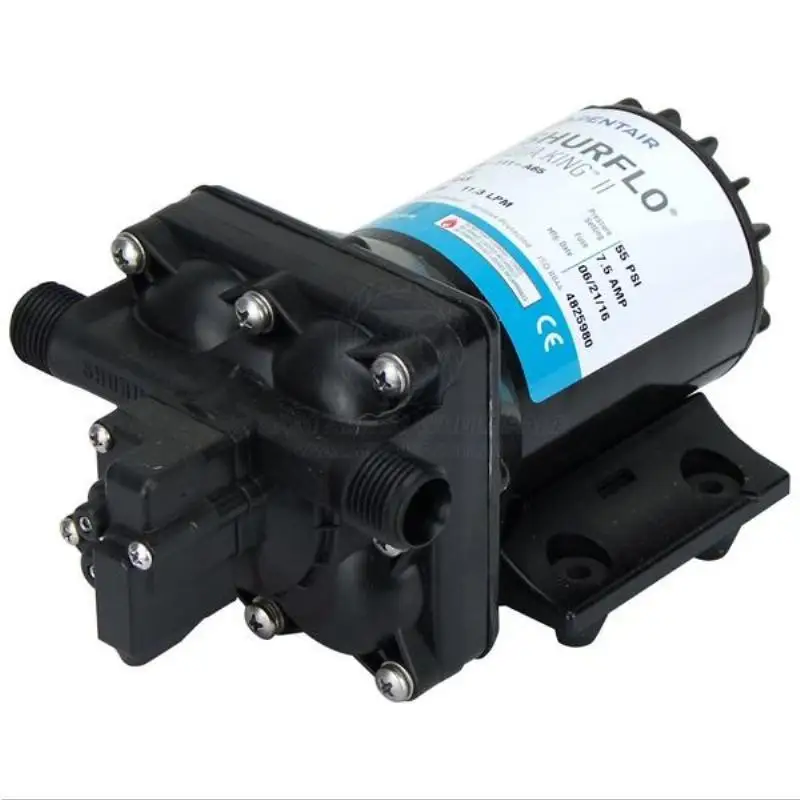
Specifications:
Voltage: 12V.
Maximum flow rate: Varies from 1.0 GPM to 5.3 GPM.
Maximum pressure: Varies from 20 PSI to 65 PSI.
Construction: Corrosion-resistant materials such as stainless steel, EPDM rubber, and polypropylene.
Features:
● Self-priming with a fixed check valve to block backflow.
● Thermal protection to prevent overheating.
● Quiet operation with low vibration.
● Can be used with fresh water or other liquids with low viscosity.
Performance:
High flow rate and pressure capabilities for various applications, including RV water systems, marine water systems, and agricultural irrigation. Also, it operates efficiently on low power consumption.
Pros:
● Wide range of models and flow rates to choose from to match specific application requirements.
● Self-priming and thermal protection features ensure safe and systematic operation.
● Corrosion-resistant construction for durability and longevity.
● Quiet operation and low vibration for comfortable use.
Cons:
● Requires regular maintenance to ensure optimal performance.
3. Flojet automatic water system pump.
Flojet is on the 3rd number. It produces a range of automatic water system pumps.
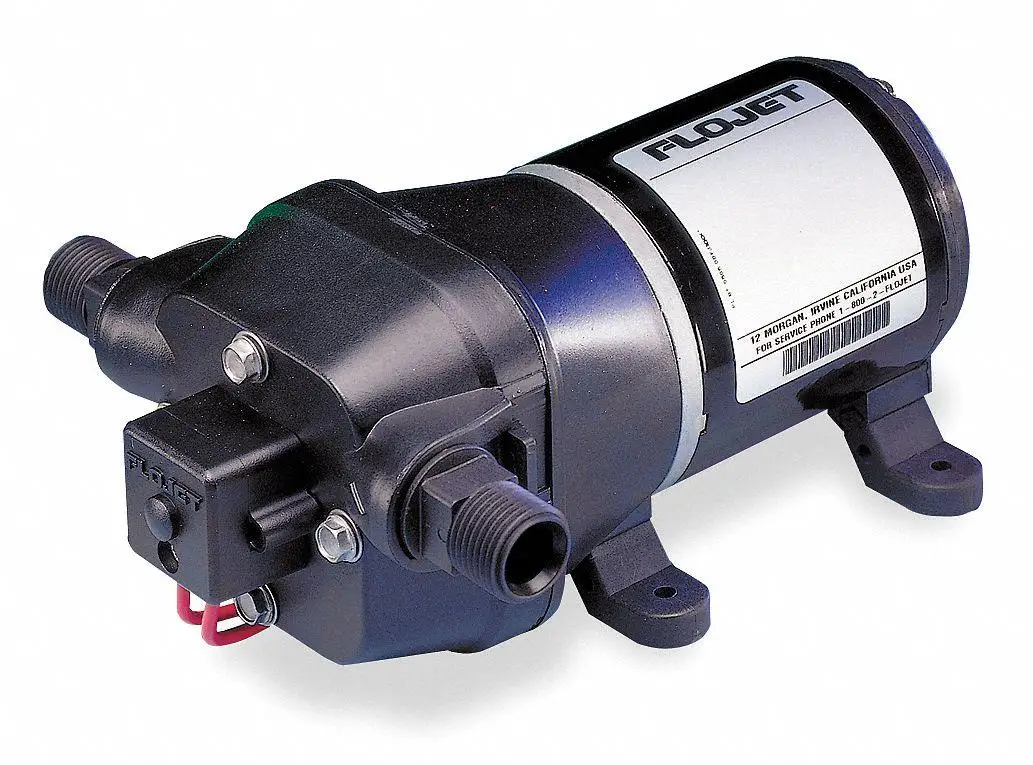
Specifications:
Voltage: 12V or 24V DC.
Flow rate: Typically ranges from 2.9 to 5.0 gallons per minute.
Pressure range: Usually between 35 and 50 pounds per square inch.
Self-priming capability: Typically up to 9 feet.
Thermal overload protection: Provided in most models.
Features:
● Automatic operation: Turns on and off automatically as needed
● Built-in pressure switch: Controls the pump’s operation based on water demand
● Run-dry protection: Avoids damage to the pump if there is no water available
● Easy installation: Most models come with straightforward instructions and mounting hardware
Performance:
Flojet automatic water system pumps are made to supply good water pressure and flow for a number of applications, including RVs, boats, and homes. They are generally efficient and have a low power draw. Although, the self-priming capability allows the pump to quickly create suction and start pumping water even when the water source is below the pump level.
Pros:
● Automatic operation eliminates the need for manual switching on and off.
● Built-in pressure switch ensures the pump only runs when there is a demand for water.
● Easy installation reduces the need for professional installation and saves time.
Cons:
● Maybe the noise level is slightly higher.
4. SEAFLO self-priming water pump.
Seaflo is number four on our list, which produces a range of self-priming water pumps.
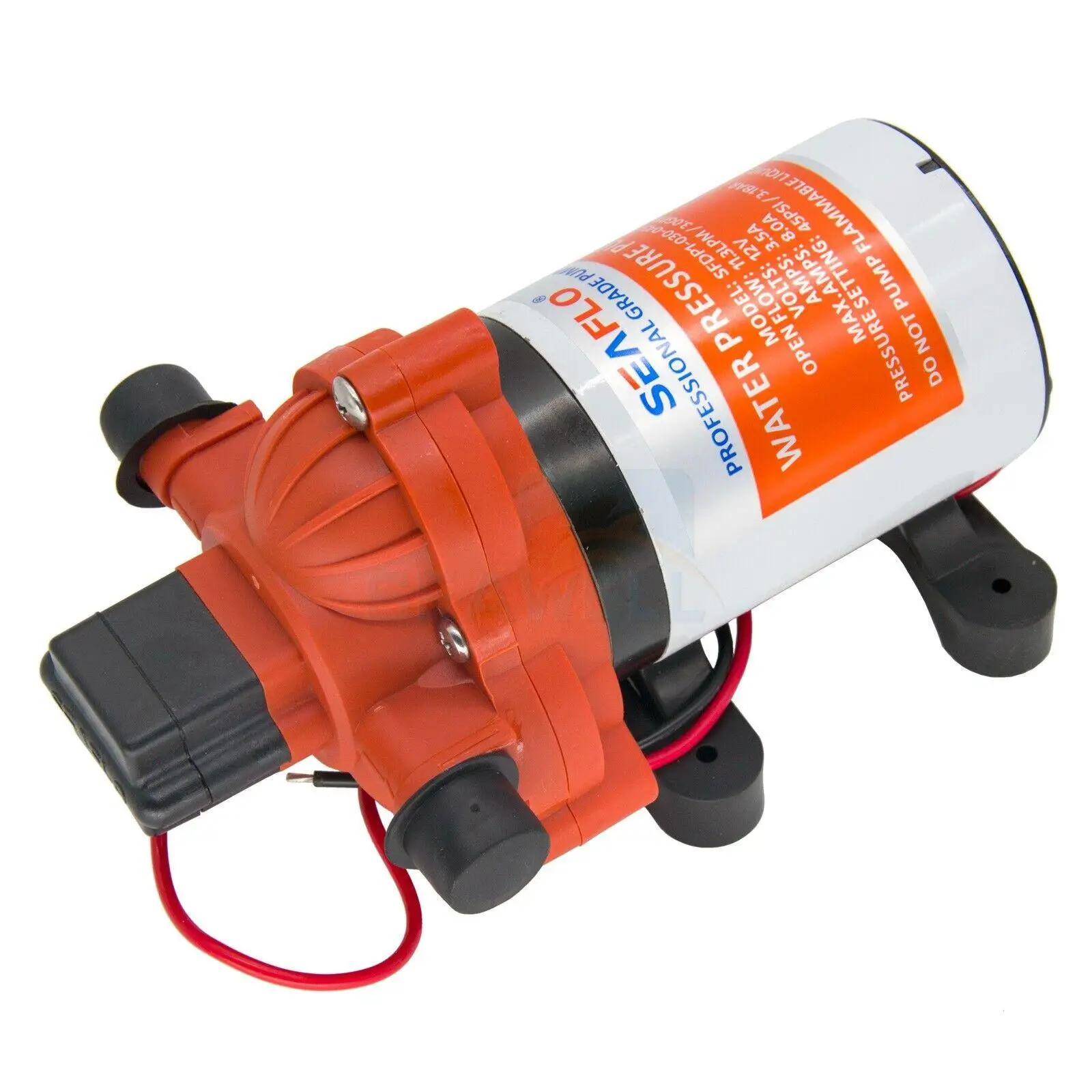
Specs:
Voltage: 12V or 24V DC.
Flow rate: Ranges from 1.2 to 7.0 gallons per minute.
Pressure range: Between 17 and 60 pounds per square inch.
Self-priming capability: Up to 6 feet.
Thermal overload protection: Provided in most models.
Features:
● Allows the pump to quickly create suction and start pumping water even when the water source is below the pump level.
● Turns on and off automatically as needed.
● Controls the pump’s operation based on water demand.
● Avoid damage to the pump if there is no water available.
● Most models come with straightforward instructions and mounting hardware.
Performance:
Seaflo self-priming water pumps are made to supply steady water pressure and flow for a number of applications, including RVs, boats, and homes. They are generally efficient and have a low power draw.
Pros:
● Self-priming capability allows the pump to be used in a variety of applications where the water source may be below the pump level.
● Automatic operation eliminates the need for manual switching on and off.
● Built-in pressure switch ensures the pump only runs when there is a demand for water.
● Run-dry protection helps prolong the life of the pump.
Cons:
● Some users may find the noise level of the pump to be too high for their liking.
5. Bayite fresh water pump.
Bayite is on the 5th number of our list that produces a range of RV fresh water pumps, including both self-priming and non-self-priming models.
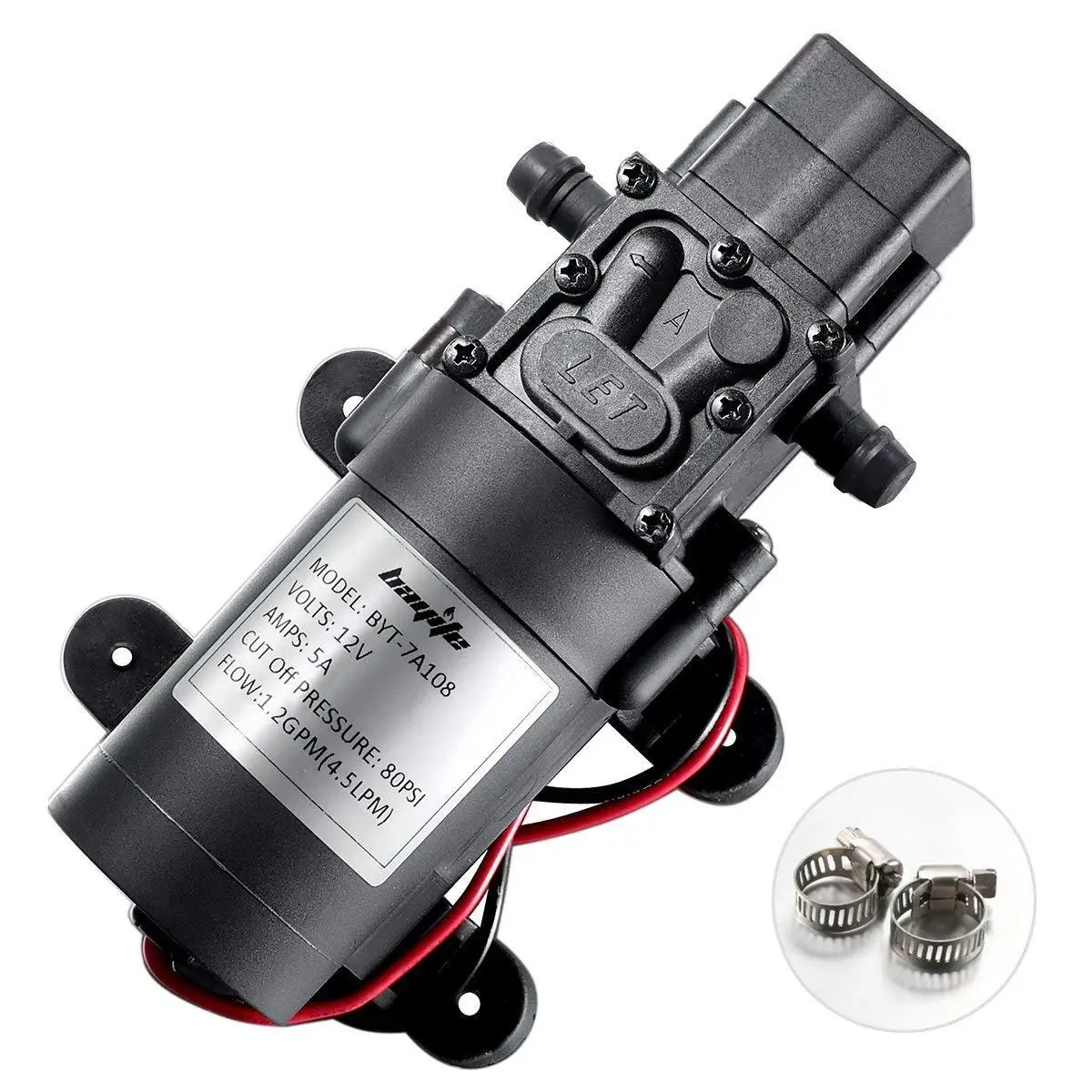
Specs:
Voltage: 12V.
Flow rate: Ranges from 1.2 to 4.5 gallons per minute.
Pressure range: Between 35 and 60 pounds per square inch.
Self-priming capability: Varies depending on the model.
Thermal overload protection: Provided in most models.
Features:
● Turns on and off automatically as needed
● Controls the pump’s operation based on water demand
● Avoid damage to the pump if there is no water available
● Most models come with straightforward instructions and mounting hardware
Performance:
Bayite freshwater pumps are made to supply steady water pressure and flow for a number of applications, including RVs, boats, and homes. They are generally efficient and have a low power draw.
Pros:
● Automatic operation eliminates the need for manual switching on and off.
● The built-in pressure switch ensures the pump only runs when there is a demand for water.
● Run-dry protection helps prolong the life of the pump.
● Easy installation reduces the need for professional installation and saves time.
Cons:
● Higher flow rates may require larger pumps, which may be more expensive and require more power to operate.
Factors to consider when choosing an RV water pump
If you’re experiencing low water pressure or strange noises coming from your travel trailer water pump, it may be time for a replacement. By doing research, the best device can be bought. Following are several things to keep in mind before choosing an RV water pump.
1. Type of pump:
There are two main types of RV water pumps; diaphragm and centrifugal. Diaphragm pumps are typically more reliable and efficient, while centrifugal pumps are usually less expensive.
2. Flow rate:
The flow rate of the pump determines how much water it can deliver per minute. You need to choose a pump with a flow rate that meets your needs depending on the number of faucets, sinks, and showers in your RV. Vevor Water Pressure Diaphragm Pump gives you a flow rate of 3.3 to 5.5 GPM, which is perfect for all kinds of jobs.
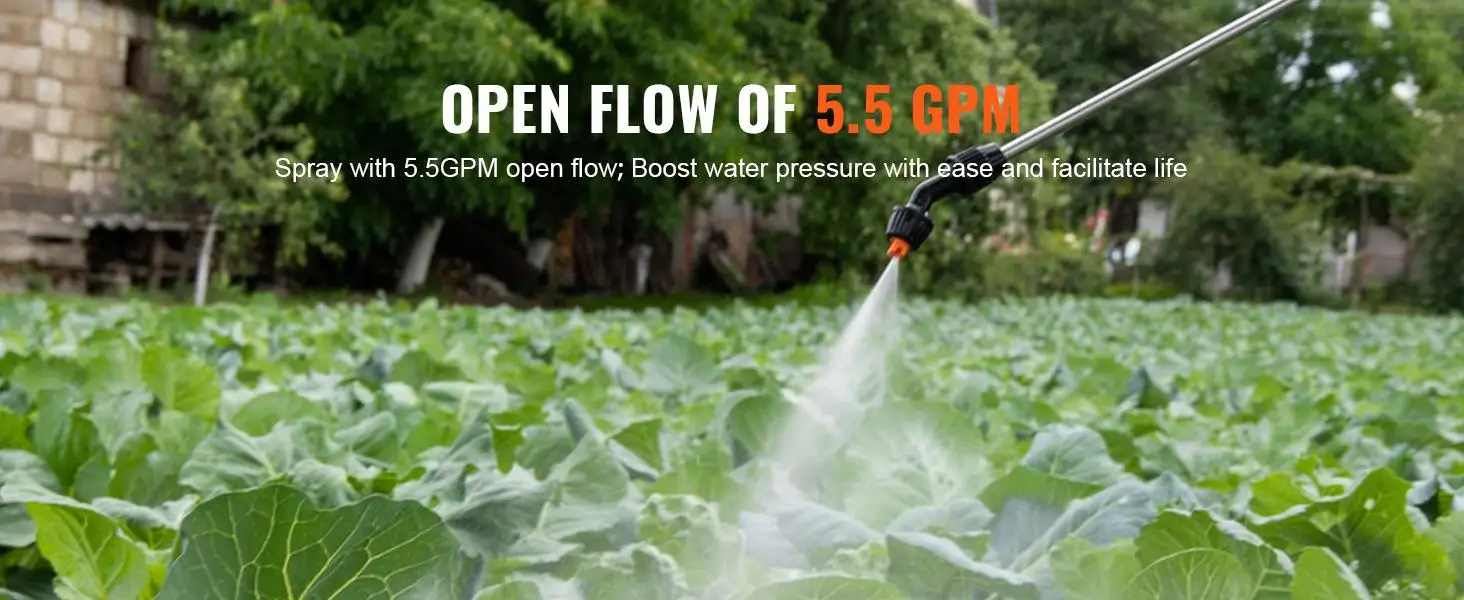
3. Pressure rating:
The pressure rating of the pump indicates the amount of pressure it can generate to move water through the RV’s plumbing system. Vevor Water Pressure Diaphragm Pump comes with an adjustable pressure rating ranging from 40 psi to 100, which you can adjust according to your requirements.
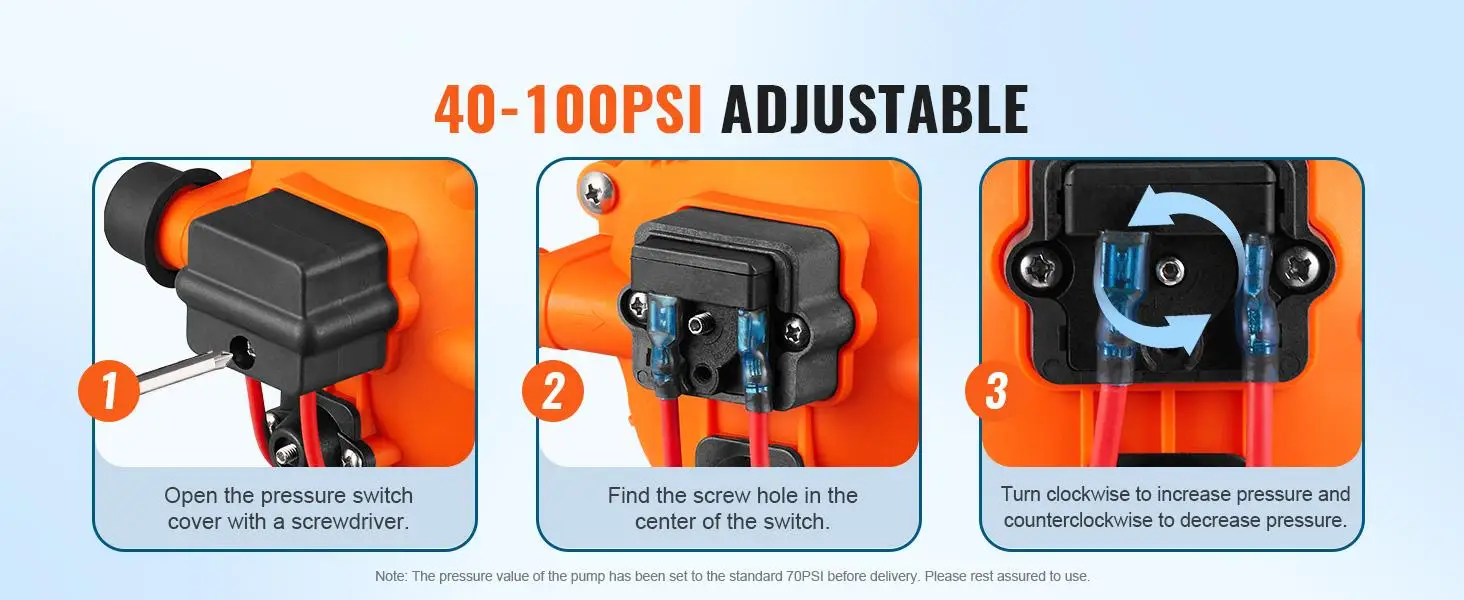
4. Noise level:
RV water pumps can be noisy, so you may want to consider a pump with a low noise level if you plan to use it frequently. If you are in the market, look for models specifically marketed as quiet RV water pumps Vevor Water Pressure Diaphragm Pump operates on extremely low noise levels, which is below 65 dB.
<





